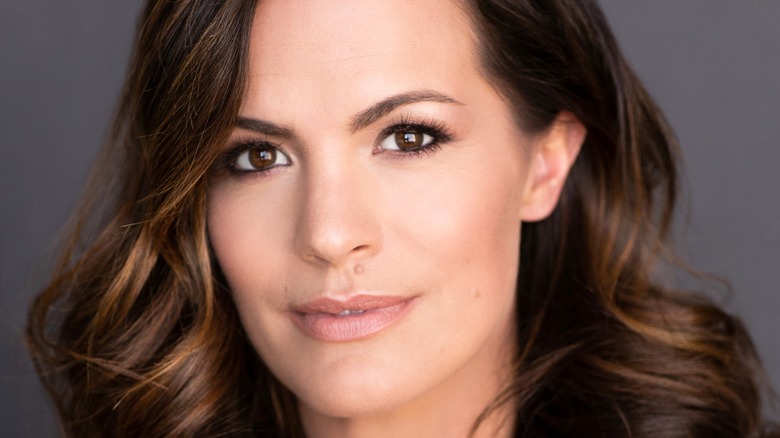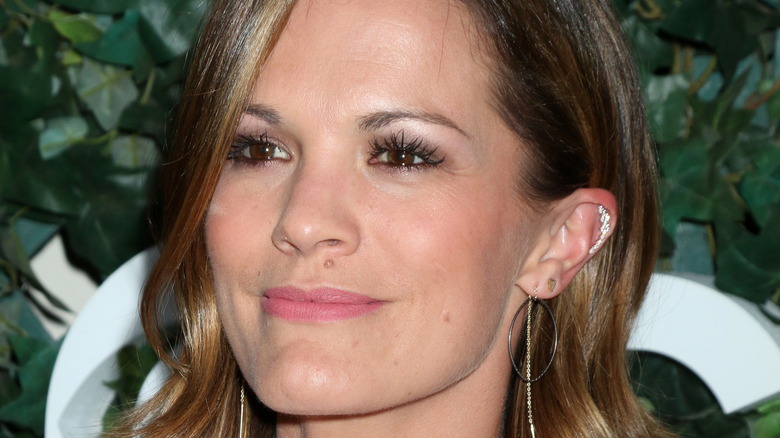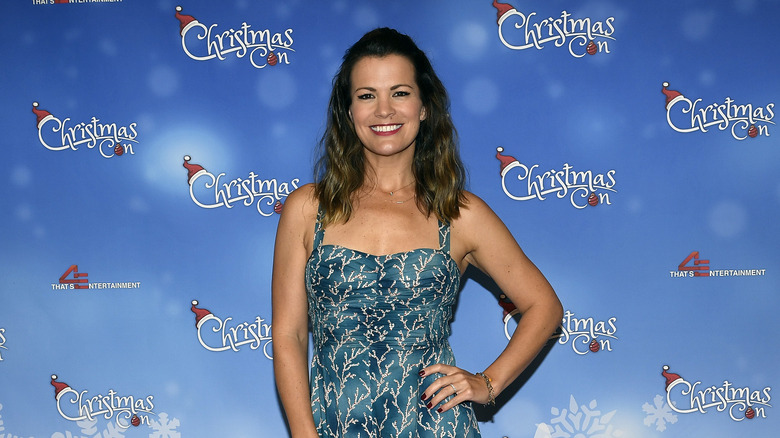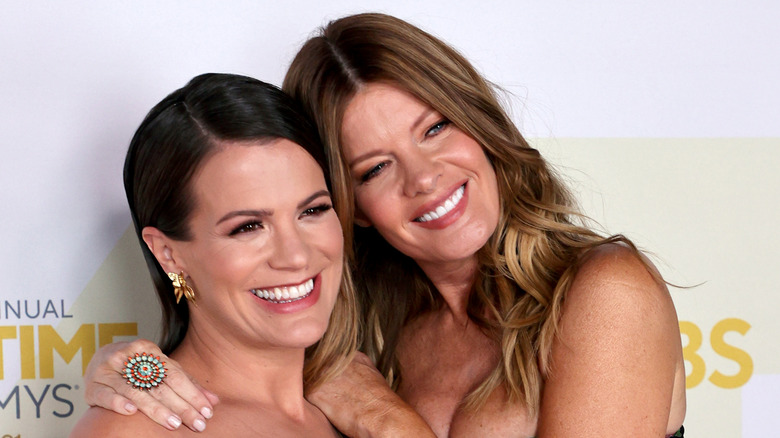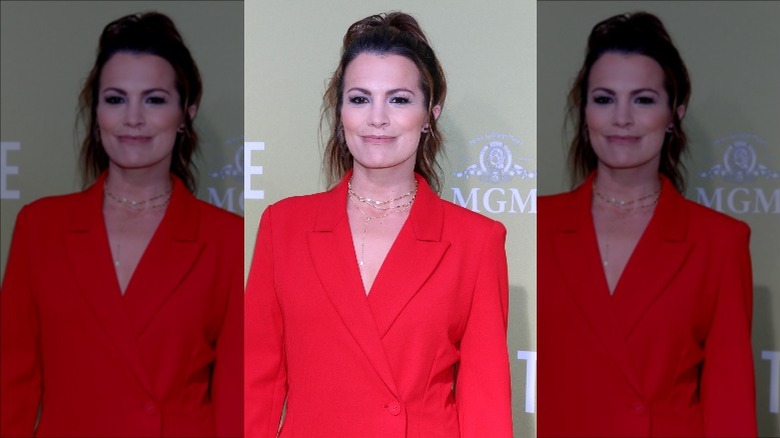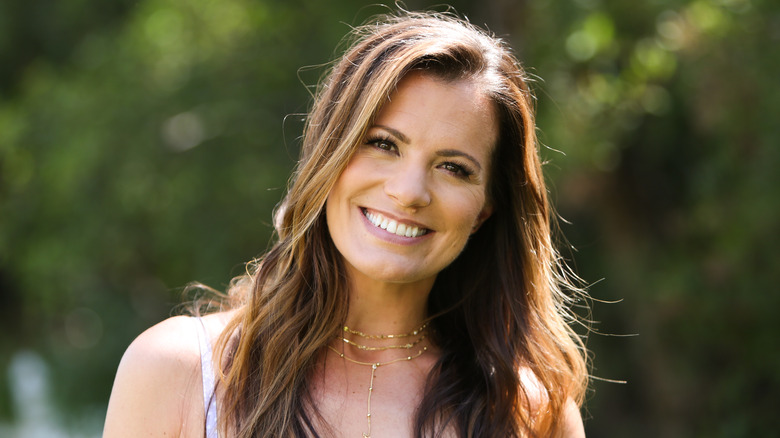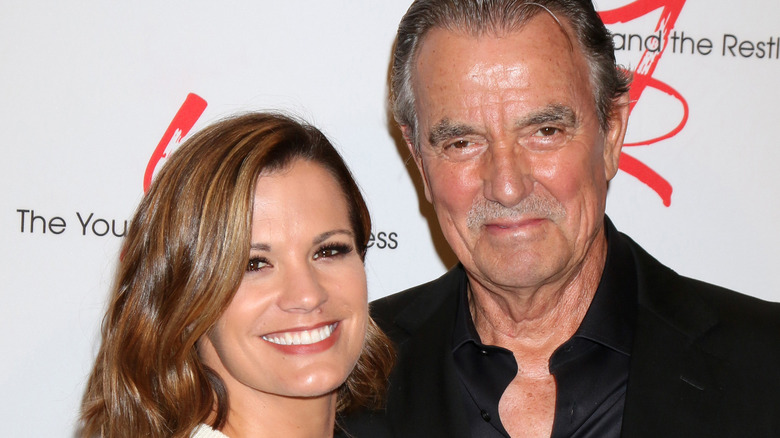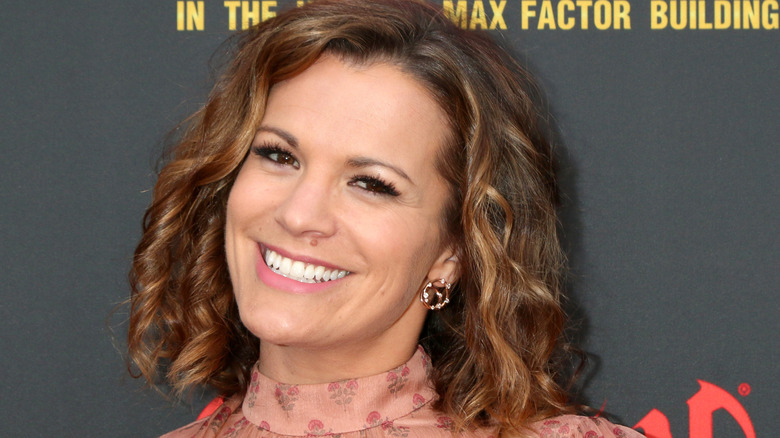Melissa Claire Egan & The Young And The Restless Writer On Chelsea's Journey - Exclusive Interview
The following article includes discussions of depression and suicide.
CBS' longest-running scripted series, "The Young and the Restless," has entered its 50th season, and the show is tackling topics it has never explored before. In this season, Melissa Claire Egan's character, Chelsea, battles with depression and thoughts of suicide. CBS released a PSA in conjunction with the episode in which Egan and fellow actors Jason Thompson and Sharon Case encourage anyone struggling or in support of someone struggling to reach out to 988 for free, confidential support to speak with trained counselors 24/7 or to go to save.org.
Egan and the show's head writer and co-executive producer, Josh Griffith, sat down for an exclusive interview with The List to further discuss the storyline and the important topics addressed this season. During the interview, the actor and writer shared why they thought this was an important story to tell and why it made sense for Egan's character. They also opened up about some of the touching responses they've received from fans since the episode aired.
If you or anyone you know is having suicidal thoughts, please call the National Suicide Prevention Lifeline by dialing 988 or by calling 1-800-273-TALK (8255).
What drove Chelsea to this point in the show
This season, the storyline of the show goes into elements of mental health and possible self-harm. What made you want to cover those topics?
Josh Griffith: It actually started as everything that I try to do with the character. I wasn't thinking about "Let's take on a social issue or a mental health issue." I was looking at where Chelsea was in her journey on the show and things that had been happening to her, and I started toying with how extreme I could take this.
The story sort of flowed, and I knew that Missy [Melissa Claire Egan] would knock it out of the park. I said, "If we can take this all the way, literally to the ledge where she's at a point where she's in so much pain, and she's in so much turmoil emotionally, that she wants to escape it and end her life, where can that — by having someone then step in and stop her from doing that — where can it take it story-wise?"
Once we had that as the bare bones, we started seeing [that] we can take this to a helpful place for the audience by showing them what people go through and how there are ways to get through it and get better. It was exploring the angle of the character, and the story came out of that — and then what we could do as far as a helpful moment all came together from that.
They didn't want to play the story for shock value
Melissa, playing Chelsea while she was going through that, what was that like for you as an actor?
Melissa Claire Egan: When Josh first told me about the storyline, at first, I was in shock at what happened to this character of 11 years of mine. I was like, "Oh my God, I can't believe she gets to that place." But I felt honored to tell the story because it is relevant right now, and so many people are suffering more than I even realized.
Since it has aired, I knew we would help people and have an effect, but I had no idea of the magnitude — the tweets and so many people saying, "This literally happened to my brother a week ago." I couldn't believe how common it was and how moved people were. I knew they'd hopefully be moved, but I didn't realize how much, which I'm so touched by and we're also proud of.
I was honored to tell it and hopeful. I wanted to do a good, respectful job of telling [this story]. You represent real people with real problems, so you want to make sure you do it well.
Griffith: Yes. Once we locked into this as a story, it was very important to all of us here and at the network that we don't sensationalize it, that we don't go only for the drama and ...
Egan: The shock value.
Josh: Right, and [we want] to tell it in an honest way because many people are going to be affected. There are so many people that have experienced this in one way or another. It would've been a disservice to them if we had sensationalized it or tried to make it into another melodramatic soap story.
Egan cried in her car after seeing the fan reactions
What was it like for you after the episode came out, seeing those responses?
Egan: I cried in my car. I did, when I saw how we'd helped people. People said, "I saw myself." There was one tweet where someone said, "I didn't know I was depressed until I saw this episode; now I'm going to get help." A stranger responded to them on Twitter, saying, "This is another number you can call."
We created this community within strangers of talking about [this] and saying, "Well, me too," and "My cousin went through this," and "My mom went through this." The conversations it has started have been so moving and was what we wanted to have happen. But to see it in front of our eyes has been touching and moving and very humbling.
Griffith: We [wanted] to follow through on that so that we see the recovery period and see Chelsea doing the work, getting the help, getting a support team over the course of a period of time. It wasn't, "Okay, now we did this, and then she's fine, and we're moving on."
Egan: That's why I was impressed with our writers. It wasn't like you put a pin in it, and a week later, she's like, "I'm good. Now, who's my next love interest?" It's her therapy. It's her making amends. It's her having setbacks. I'm still shooting episodes where that's happening. She still struggles. She's not just better, which wouldn't be a realistic portrayal. I'm really impressed with the writers.
Griffith: We had a doctor working with us that was amazing that [Egan] talked to. [He had] fantastic input and insight, and whenever we would veer off in the wrong direction, he was very good at saying, "I get why you're doing that, but here's a little more realistic way to do it." It always ended up being actually a more dramatic way to go, realistically.
Egan: Dr. Dan Reidenberg from the International Association for Suicide Prevention was so helpful.
How they handled the story delicately
As you said, you didn't want to sensationalize it. What were your biggest concerns as you were writing the episode to handle it delicately?
Griffith: We were always [trying] to handle it delicately and honestly and emotionally, to plumb the depth of the emotion and to always be true to the character so that we didn't twist the character to meet the story. We brought the story to the character, and that was very important ... We knew that Chelsea was in a place where this was realistic. She could get to this point. We were always very mindful that we didn't rush through it, that we explored all of the angles of it.
I want to also mention what was really important to the story, and I want to give kudos to Jason Thompson, who's playing Billy, who is the person who talks her off the ledge and is there with her through her recovery supporting her. It was important for that relationship not to be a quick love story, to not be the quick, "Okay, now here we are."
Egan: [Not to have them] kiss at the end of that episode.
Griffith: We see her journey, and we see his journey as someone who had no idea if he was saying the right things or if he was doing the right things. To be honest about those characters was very important to us, and I think we've done it.
Egan: It's true. If you haven't been in Chelsea's shoes — if you don't suffer from mental health issues — you at least know somebody who has. You've seen families destroyed, family friends, and friends from childhood. Everyone, even if they don't suffer from it, can relate to it.
Griffith: Absolutely.
Egan: You feel for him in the situation terribly as well.
Griffith: If you tell a good story, it will still engage. Even if they don't know or they have no experience, with the simple fact of what she's going through and the deep emotions and the amazing performance, you're going to feel empathy and connection and compassion, and you're going to want to take the journey.
Mental health can be something that people are scared to talk about. Were you hopeful that it would open up a conversation in the way it has? Or was that surprising to you?
Griffith: We were hopeful that it would open a conversation. I had no clue that it would be as profound and as big as it has been, which is incredibly rewarding that we've been able to touch these people and that it's helped and it's given them not only a story to watch but something to generate hope.
Egan believes this is the most relatable storyline her character has had
Why did you feel it was important to also release the PSA in conjunction with the episode?
Egan: We had to. It's hard to put this in front of people's faces and be like, "Okay, bye." We wanted to make sure people had the right resources because it did pull at the heartstrings. It did make a lot of people feel vulnerable and feel seen, but then you can't end it with a Clorox commercial. You have to help give them the resources if they're hurting to be able to get help. It is massively important. Nothing against Clorox, by the way — we love our sponsors. But you have to be responsible with it as well. You can't leave that in someone's lap and not give them tools to help themselves.
Melissa, you've been playing Chelsea for several years. Do you feel she's grown a lot to get to this point and then also coming out of that?
Egan: Absolutely. I feel so grateful for all this ... You have these episodes around five days a week, all year round. I've gotten to tell so many amazing stories and some fun ones, some lighter ones, some very serious ones. This is definitely the most serious and the most relatable. It's been incredible.
I'm grateful that the writers told it in a way where people weren't going, "What? Why would she want to kill herself?" You see the build-up of her suffering and her pain and struggling. I didn't hear one person say, "That's not realistic." You saw everything building up to that point that led her to that place, which I'm grateful for. Now, I'm really happy we're telling the story of her recovery, which isn't easy, and there are setbacks, and she has to do a lot of hard work. I'm grateful to tell that part of the story as well. It's been incredible.
Griffith: She [Egan] is remarkable.
Egan: I have good writing. It's easy when you have amazing words to say; it's a lot easier.
Griffith: No, you could've messed it up. You didn't.
Why they wanted to show setbacks in Chelsea's treatment
What are you hoping that people take away after watching the storyline as a whole?
Egan: Number one is that you're not alone. Also, real depictions of real struggles, to normalize what people go through ... Feeling isolated and alone is one of the hardest things in life. Hopefully, people are feeling less alone and knowing that there's hope.
Griffith: There is hope, there are answers, there is help, and you're never alone. You can always find a support team.
You've mentioned a few times that as Chelsea is going through therapy, there are setbacks. Was that something that was important to you so it didn't look like she was cured overnight?
Griffith: Right. That came from also talking with Dr. Dan [Reidenberg], that it's not a linear path. It's not a clear cut, "Every day, I'm going to be better, and I know that's going to happen." There's still a lot of work to do, and there are a lot of setbacks that you're going to face.
What the therapy is giving you is the tools to deal with those setbacks, which is what's crucial so that you don't end up on the ledge again. You take what you learn. They give you the tools to move forward and deal with the setbacks because ... [I hope I'm not] saying the wrong thing, but I don't think you ever cure this. It's something that you learn to cope with. It's something that you learn to deal with daily.
Egan: It's a disease. We say that a lot — depression is a disease.
Griffith: This is a story for Chelsea for life now that will always be a part of her, what happened that led her there, and everything she's done after it. It will be a constant continuing journey for her, which, as a dramatist, is fantastic.
Egan: As an actor, it's pretty fantastic, too.
Plans for coming seasons
Are you hoping to continue this storyline through next season?
Griffith: Years and years. Years of this.
Egan: I'm tired, Josh. I'm so tired. Chelsea needs to go to Hawaii and sip a piña colada on the beach. Chelsea needs a nap. Just kidding — I'm very grateful. But I don't know. You can find out more of a scoop for me because he won't tell me much.
Griffith: I'll say this is — yes, there's much, much more to play.
Egan: Which is great.
This is also the 50th season of the show. What's it like for you both working on something that has such a long history and where the characters have been around and have gone through so much?
Griffith: Remarkable and humbling.
Egan: It's so thrilling to be here — to be here in general, but also for such a milestone.
Griffith: We haven't been here for 50 years. Let's make that clear right now.
Egan: It's so exciting to be [part of] ... It's massive. How many people can say they were part of a show's 50-year anniversary? It is very humbling and exciting. I can't wait to see what's coming up, because they won't tell me anything. I can't wait to see what stories are coming in.
"The Young and the Restless" is broadcast on weekdays at 12:30 – 1:30 p.m. ET/11:30 a.m. – 12:30 p.m. PT on the CBS Television Network and is produced by Bell Dramatic Serial Company in association with Sony Pictures Television. Anthony Morina is the show's executive producer. The co-executive producer and head writer is Josh Griffith. For more information and photos regarding "The Young and the Restless," go to: Paramount Press Express | CBS Entertainment | The Young and the Restless.
This interview was edited for clarity.
